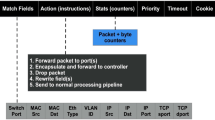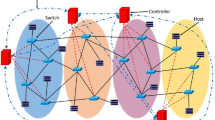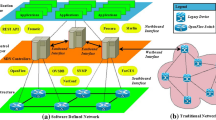Abstract
In this paper, an analytical bandwidth evaluation of generic reliable multicast protocols is presented. Our analysis is based on a realistic system model, including data packet and control packet loss, asynchronous local clocks and imperfect scope-limited local groups. Of particular importance are two new classes with aggregated acknowledgments. In contrast to other approaches, these classes provide reliability not only in case of message loss but also in case of node failures. Finally, we have analyzed the influence of the branching factor, i.e. the size of local groups in tree-based approaches, on a protocol's performance, which is an important parameter to improve performance. Our results prove that hierarchical approaches are superior. They provide higher throughput as well as lower bandwidth consumption. However, their performance is influenced by the optimal branching factor setting. The optimal branching factor depends mainly on the probability for receiving messages from other local groups. If this probability is zero, a small branching factor leads to the best results. On the other hand, if this probability is nonzero, which is likely if TTL scoping is used, larger local groups provide better performance. Finally, we have confirmed our analysis with simulation studies of XTP, SRM, RMTP and TMTP.
Similar content being viewed by others
References
S. Bajaj, L. Breslau, D. Estrin, K. Fall, S. Floyd, M.H. P. Haldar, A. Helmy, J. Heidemann, P. Huang, S. Kumar, S. McCanne, R. Rejaie, P. Sharma, K. Varadhan, Y. Xu, H. Yu and D. Zappala, Improving simulation for network research, Technical Report 99-702, University of Southern California, USA (1999).
K. Calvert, M. Doar and E. Zegura, Modeling Internet topology, IEEE Communications Magazine 35(6) (1997) 160–163.
S. Floyd, V. Jacobson, C. Liu, S. McCanne and L. Zhang, A reliable multicast framework for light-weight sessions and application level framing, IEEE/ACM Transactions on Networking 5(6) (1997) 784–803.
F. Gramsamer, Bimodal traffic for computer interconnects, in: Proc. of the Internat. Symposium on Performance Evaluation of Computer and Telecommunication Systems (SPECTS 2001), Orlando, USA, 2001 (SCS) pp. 583–589.
S. Kasera, J. Kurose and D. Towsley, A comparison of server-based and receiver-based local recovery approaches for scalable reliable multicast, in: Proc. of IEEE INFOCOM Conf. on Computer Communications, New York, USA (IEEE Press, New York, 1998) pp. 988–995.
B. Levine and J. Garcia-Luna-Aceves, A comparison of reliable multicast protocols, Multimedia Systems 6(5) (1998) 334–348.
B. Levine, D. Lavo and J. Garcia-Luna-Aceves, The case for reliable concurrent multicasting using shared ack trees, in: Proc. of the 4th ACM Multimedia Conference (MULTIMEDIA'96), New York, USA (ACM Press, New York, 1996) pp. 365–376.
C. Maihöfer and K. Rothermel, A delay analysis of tree-based reliable multicast protocols, in: Proc. of the 10th Internat. Conf. on Computer Communications and Networks, Scottsdale, USA (IEEE Press, New York, 2001) pp. 274–281.
C. Maihöfer and K. Rothermel, A delay analysis of tree-based reliable multicast protocols, Technical Report TR 2001/03, University of Stuttgart (2001).
C. Maihöfer and K. Rothermel, Optimal branching factor for tree-based reliable multicast protocols, Computer Communications 25(11/12) (2002) 1018–1027.
C. Maihöfer, K. Rothermel and N. Mantei, A throughput analysis of reliable multicast transport protocols, in: Proc. of the 9th Internat. Conf. on Computer Communications and Networks, Las Vegas, USA (IEEE Press, New York, 2000) pp. 250–257.
J. Nonnenmacher, M. Lacher, M. Jung, G. Carl and E. Biersack, How bad is reliable multicast without local recovery, in: Proc. of IEEE INFOCOM Conf. on Computer Communications, New York, USA (IEEE Press, New York, 1998) pp. 972–979.
S. Paul, K. Sabnani, J. Lin and S. Bhattacharyya, Reliable multicast transport protocol (RMTP), IEEE Journal on Selected Areas in Communications (Special Issue on Network Support for Multipoint Communication) 15(3) (1997) 407–421.
S. Pingali, D. Towsley and J.F. Kurose, A comparison of sender-initiated and receiver-initiated reliable multicast protocols, in: Proc. of the Sigmetrics Conf. on Measurement and Modeling of Computer Systems, New York, USA (ACM Press, New York, 1994) pp. 221–230.
G. Poo and A. Goscinski, Performance comparison of sender-based and receiver-based reliable multicast protocols, Computer Communications 21(7) (1998) 597–605.
K. Rothermel and C. Maihöfer, A robust and efficient mechanism for constructing multicast acknowledgment trees, in: Proc. of the 8ht Internat. Conf. on Computer Communications and Networks, Boston, USA (IEEE Press, New York, 1999) pp. 139–145.
T. Speakman, D. Farinacci, S. Lin and A. Tweedly, PGM reliable transport protocol specification, Internet Engineering Task Force, Network Working Group, Internet draft <draft-speakman-pgm-spec-04.txt> (work in progress) (2000); URL: http://www.ietf.org/internet-drafts/draft-speakman-pgm-spec-04.txt.
T.W. Strayer, B.J. Dempsey and A.C. Weaver, XTP-The Xpress Transfer Protocol (Addison-Wesley, Reading, MA, 1992).
D. Waitzman, C. Partridge and S. Deering, Distance vector multicast routing protocol, Internet Engineering Task Force, Network Working Group, Request for Comments, RFC 1075 (1988); URL: ftp://ftp.isi.edu/in-notes/rfc1075.txt.
B. Whetten and G. Taskale, An overview of the reliable multicast transport protocol II, IEEE Network 14(1) (2000) 37–47.
M. Yajnik, J. Kurose and D. Towsley, Packet loss correlation in the MBone multicast network, in: Proc. of IEEE Global Internet, London, UK (IEEE Press, New York, 1996) pp. 94–99.
M. Yajnik, S. Moon, J. Kurose and D. Towsley, Measurement and modelling of the temporal dependence in packet loss, in: Proc. of IEEE INFOCOM Conf. on Computer Communications, New York, USA (IEEE Press, New York, 1999) pp. 345–352.
M. Yamamoto, J. Kurose, D. Towsley and H. Ikeda, A delay analysis of sender-initiated and receiverinitiated reliable multicast protocols, in: Proc. of IEEE INFOCOM Conf. on Computer Communications, Los Alamitos (IEEE Press, New York, 1997) pp. 480–488.
R. Yavatkar, J. Griffioen and M. Sudan, A reliable dissemination protocol for interactive collaborative applications, in: The 3rd ACM Internat. Multimedia Conference and Exhibition (MULTIMEDIA '95), New York, USA (ACM Press, New York, 1995) pp. 333–344.
Author information
Authors and Affiliations
Rights and permissions
About this article
Cite this article
Maihöfer, C. Bandwidth Analysis and Simulation of Reliable Multicast Transport Protocols. Telecommunication Systems 23, 201–237 (2003). https://doi.org/10.1023/A:1023681221877
Issue Date:
DOI: https://doi.org/10.1023/A:1023681221877




